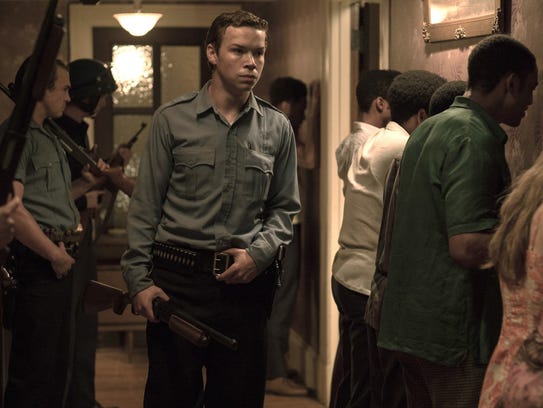Paul Greengrass’s Captain Phillips opens in colour, but with a black-and-white contrast. In leafy, plentiful Vermont, captain Richard Phillips (Tom Hanks) prepares for his next assignment, steering his cargo vessel from Oman to Mombasa in Kenya; evidently a family man, he stuffs photos of his nearest and dearest into his holdall, and – on the drive to the airport – worries to his wife (Catherine Keener) about the world’s growing ruthlessness, and the effect it may have on their college-age son.
In a parched Somalia, meanwhile, young men of a similar age emerge from cramped and makeshift shacks to line up on a beach, clutching weapons to their chests. They, too, are heading out to sea – or at least some of them will be, for it transpires being picked for a piracy mission is not unlike being selected for a school football team or off-the-books construction work. As with the latter, this is a high-risk, high-reward engagement: fail to make the squad, and you and your impoverished family will only fall further behind.
As in Greengrass’s American breakthrough United 93, what follows will be a fateful collision of First and Third Worlds. The pirates track Phillips’ vessel by radar as it charts its own course through the Somali basin (“We can’t attack a herd”); they steel themselves to relieve the ship of its sizeable bounty; and soon, the Captain and his Somali opposite, a tenacious young man named Muse (Barkhad Abdi) are eyeing one another up through their binoculars.
This David-and-Goliath scenario has already been played out on our screens this year – in the very fine Danish drama A Hijacking – but that film, a fiction from the brains behind TV’s Borgen, was a matter of skilful negotiation, where this more expansive, Sony-backed enterprise, drawn from the real Richard Phillips’ memoir about a 2009 hijacking, is geared much more towards suspense and action.
What Greengrass brings to the project is his usual, remarkable integrity: he gives the Somalis a (subtitled) voice, and never allows the film to stray into Under Siege-style superheroics. Much of it is shot (by the ace cinematographer Barry Ackroyd) in that nervy, increasingly common pseudo-documentary mode: the scenes on Phillips’s bridge as the pirates approach, are repelled, and then rally again, are not so dissimilar from the frenetic air traffic control activity at the opening of United 93.
At the centre of these scenes stands one of the most inspired casting decisions of 21st century cinema. Greengrass has been savvy enough to recognise Hanks as a figurehead of contemporary capitalism: a captain of Hollywood industry, shortly to be seen playing Walt Disney, and able to shift even potentially difficult product like this past the pre-production discussion stage and out to the multiplexes.
Yet this role also relies upon the actor’s reputation as a dependable pro: like the generally unflappable Phillips, Hanks is known for showing up first thing and unfussily getting on with the job in hand. Though he has seniority over much of the cast here, the star is never allowed to pull rank, in part because Greengrass and his screenwriter Billy Ray are interested in the way these crews work as units – the American sailors complaining to Phillips that they didn’t sign up to dodge bullets, the Somalis undergoing a more brutal leadership challenge – but also because Hanks is now older, heavier, wearier than he once was.
We see how the hijackers – wiry, wily, hungrier souls – might just get around Richard Phillips’ defences, but at the same time, how inexperienced the pirates are, how impatient they are to grab the big brass ring, and how Phillips might just be able to teach them a thing or two during the crisis: the film’s something of a lesson in the importance of keeping a firm hand on the rudder, behind the camera as well as in front of it.
Again, you marvel at Greengrass’s technical and logistical skill, which in this instance may even outstrip his work on the Bourne sequels – not least because Captain Phillips was actually shot at sea, rather than in a tank somewhere. And Ray’s script keeps moving and reframing this impasse in impressive ways: the boat gets smaller around the halfway mark, narrowing the focus and upping the tension until the life-or-death moment when we’re left peering into a small porthole, wondering – most likely worrying – how this stand-off will be resolved.
This push towards self-containment might be regarded as Greengrass’s reaction to the sprawling, multi-character messiness of 2010’s Green Zone, and suggests one possible flaw with the new film: an absence of any wider political discussion. A Hijacking gained a critical edge by bringing to the table shipping company bosses who were prepared to sell their workers out; Phillips’ vessel drifts out of radio contact early on.
Instead of a corporate presence, we instead get the armed forces, who are mobilised late on in the film, and after all the choppiness – and the closing half-hour may be as gruelling as any 12A-rated feature is now likely to get – one senses a degree of reassuring control being exerted again, as though this hijacking were no more than an isolated incident, to be swiftly and bloodily resolved. Perhaps it’s only Hanks’s lingering depiction of shock that prevents you from forgetting the carnage by the time you reach the car park.
You may be too tensed up by this point to notice, though, and perhaps we shouldn’t carp unduly about a major studio release that fosters such even-handedness in the treatment of its characters. Aboard the good ship Greengrass, there is ultimately no good and no bad, no black or white, just people – vulnerable little fish in a very big pond, doing whatever they need to survive.
(MovieMail, October 2013)
Captain Phillips screens on ITV1 tonight at 10.15pm.








